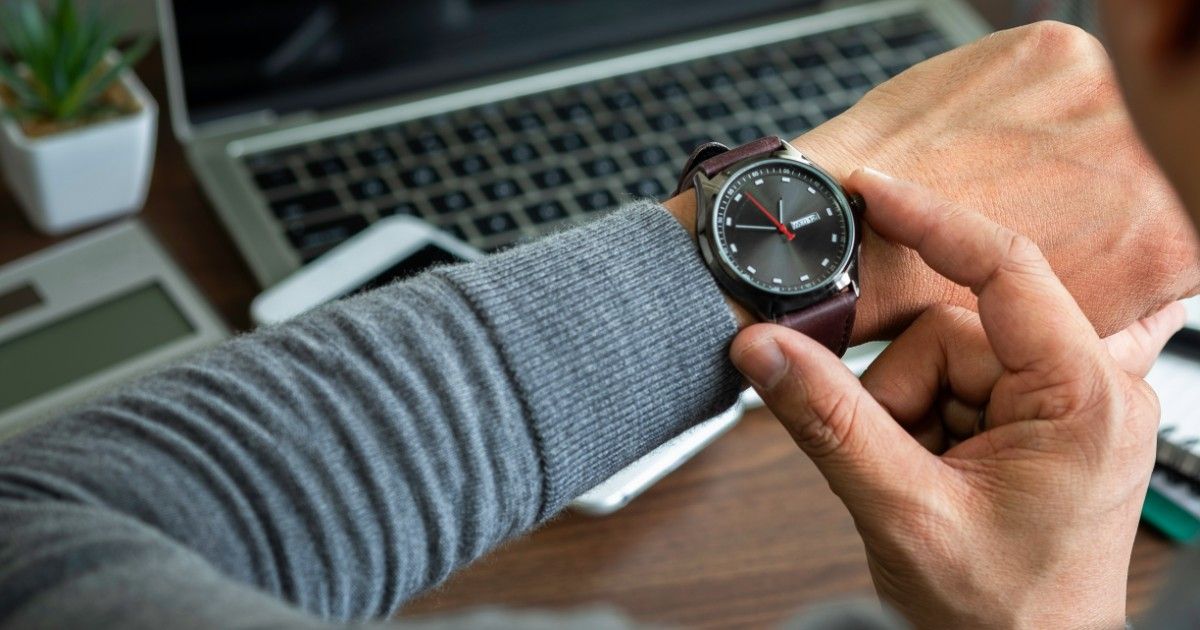Chronophobia is the persistent, intense, irrational fear of time passing. [1] It is commonly exhibited by prisoners, elderly people, and those with a terminal condition.
People with chronophobia might feel that there is not enough time to accomplish the things they want for themselves. They may avoid looking at clocks or calendars and thinking about the future, considering the progression of time to be relentless and fearing the uncertainty that accompanies it.

What is chronophobia?
Chronophobia is the irrational and intense fear of time, particularly the passage of time and the uncertainty it brings about the future. People with chronophobia often experience anxiety, distress, or panic when considering the relentless progression of time.
Sufferers often feel like time is slipping away and their phobia can be triggered by any event that reminds them of the passing of time. Weddings, birthdays, and festivals may cause them stress and anxiety. These triggers may cause them to ruminate over their own mortality, how immense time feels, how slowly it moves, and how little control they have over it.
They might have trouble handing in assignments on time or remembering social engagements as they actively avoid checking their calendars. If their chronophobia goes unchecked, they may isolate themselves from others due to feeling so overwhelmed by their fear of passing time.
While chronophobia may not be as commonly known as other phobias such as acrophobia (a fear of heights) or arachnophobia (a fear of spiders), it has garnered increased attention in recent years.
Chronophobia is considered a specific phobia. Specific phobias are characterized by an extreme, irrational fear of a situation or object disproportionate to the danger it actually poses. [2] Roughly 12.5% of U.S. adults experience a specific phobia in their lifetime. [2]
Symptoms of chronophobia
The symptoms of chronophobia can vary from person to person and can be split into physical, behavioral, and psychological sections. Here are some common physical symptoms, and co-occurring conditions, of chronophobia:
- Anxiety attacks
- Palpitations
- Racing heart
- Dehydration
- Dry mouth
- Nausea
- Trembling
- Isolation
- Comorbidly occurring alongside depression
Behavioral symptoms related to chronophobia include:
- Avoidance: Individuals may avoid situations, commitments, or tasks that trigger anxiety about time or the future. Examples include milestone events, yearly festivals, and planning for the future.
- Procrastination: Chronic procrastination can result from the fear of time, as individuals delay tasks and deadlines due to anxiety.
- Isolation: Fear of time and future-related worries can lead to social isolation as individuals withdraw from social interactions and other commitments.
- Sleep disturbances: Chronophobia can lead to difficulty falling asleep or maintaining a regular sleep pattern, resulting in insomnia.
Psychological symptoms related to chronophobia include:
- A pervasive sense of disorientation that makes time feel like it is sped up or slowed down.
- An awareness that the phobia is irrational, but an inability to confront
- Overwhelming feelings of dread and anxiety whenever the concept of time passing is considered. These can result inanxiety
Causes of chronophobia
While chronophobia can affect anyone, there are certain members of society who are more susceptible to developing it than others. These include:
- Prisoners: People who are imprisoned are particularly prone to experiencing chronophobia, with sufferers said to dread the passing of time. [3] The duration and immensity of time overwhelm a prisoner with chronophobia, with those in solitary confinement particularly affected. Thedisorientation, panic, and neurotic fear associated with time are referred to as prison neurosis. [3]
- People who have experienced trauma: Individuals who have experienced traumatic events, which have altered their sense of time. For example, someone who has lived through a natural disaster or pandemic. Both phenomena would warp one’s sense of time, with quarantines and survival becoming priorities. This could lead to them dissociating with time and fearing the uncertainty the future holds.
- People with a terminal illness or disability: People with a terminal illness, disability,or fighting long-term diseases may be more susceptible to developing chronophobia. They may feel that every milestone event that passes hammers home what they are missing out on due to their illness or disability. Others may constantly feel beleaguered by every day that passes without any sign of improvement. This fear of time is more common among people living in closed environments, such as hospitals or nursing homes. [4]
- Individuals with other mental health conditions: People who already have a predisposition to anxiety disorders, PTSD, mood disorders, or major depressive disorder may be more prone to developing chronophobia.
Diagnosing chronophobia
The first step to receiving a chronophobia diagnosis is contacting a mental health provider for an assessment. The mental health professional – typically a psychiatrist, psychologist, or therapist – will discuss your experiences, symptoms, and feelings related to chronophobia.
They will ask you about any traumas you’ve faced in your life and how long you’ve been feeling this way.
In order for a phobia to be diagnosed, it has to meet the DSM-V’s diagnostic criteria. These are set out below: [5]
- Marked fear or anxiety about a specific object or situation.
- Immediate anxiety response when confronted with the phobic stimulus.
- Avoidance behavior is aimed at preventing exposure to the phobic stimulus.
- The fear or anxiety is excessive or unreasonable.
- The fear or anxiety causes significant distress or impairment in social, occupational,or other important areas of daily functioning.
- Duration of symptoms for at least six months.
- Children may convey the fear through tantrums, crying, screaming,or clinging.
- Symptoms are not better explained by another mental disorder.
If all the above criteria are met in regard to your fear of time passing, the mental health provider will diagnose you with the specific phobia, chronophobia, and will work with you to develop a treatment plan that may include therapy, medication, or other interventions tailored to the specific needs of the person.
Chronophobia treatment
When your symptoms begin disrupting your life, it’s time to seek treatment. Treatment for chronophobia, like other phobias, includes therapeutic approaches, medication, or a combination of both.
Exposure therapy
Exposure therapy is the frontline treatment for phobias. [1] It involves gradual and controlled exposure to the feared stimulus (in this case, situations related to time). This exposure is done in a systematic and supportive manner to desensitize the individual and reduce anxiety over time.
As there is no specific object in chronophobia, a therapist may get you to confront the aspects of passing time you find anxiety-inducing and distressing. This will be repeated in many different forms until you become increasingly comfortable with former triggers. [1]
People are taught relaxation techniques and breathing exercises to help when they are confronting their triggers in exposure therapy. When carried out dutifully, exposure therapy helps over 90% of people with phobias. [1]
Cognitive behavioral therapy (CBT)
CBT helps individuals identify and challenge irrational thoughts and beliefs about time and the future. Through cognitive restructuring, individuals can replace anxiety-provoking thoughts with more rational and balanced ones.
Medication
Anti-anxiety medication, such as benzodiazepines and beta-blockers, may be prescribed alongside a therapeutic approach.
Self-care strategies for managing chronophobia
In addition to official professional treatment, there are supplementary strategies you can deploy at home to cope with your fear of time. These include:
- Practicing relaxation techniques: Engage in relaxation exercises, such as progressive muscle relaxation or yoga.
- Mindfulness meditation: Practice mindfulness to stay present and reduce anxiety about the future. Living in the moment can feel challenging for people with chronophobia, and taking time to practice mindfulness can help you train your mind and stay rooted in the present.
- Breathing exercises: Use deep breathing exercises to calm the body’s stress response.
- Support groups: There are many support groups, both in-person and online, that can be helpful for people with phobias. Having a structured approach to sharing your experiences can be particularly useful in the case of chronophobia, where structure and time are such flimsy concepts.
- Setting goals: Break down tasks and set achievable, manageable goals to reduce time-related pressure. Try and make planning feel like an enjoyable part of life. Use a journal, a mobile application,or a whiteboard to write down things you’re looking forward to in the future.
Complications of chronophobia
If left untreated, chronophobia can have a debilitating impact on your life. People can struggle to adapt to their community, hold down a job, and form relationships. They may feel so overwhelmed by their symptoms, they isolate themselves.
Further mental health issues may develop as a result of an untreated phobia. For example, anxiety may worsen and depression could co-occur. Talk to a healthcare provider as soon as possible if you are struggling with symptoms of chronophobia, or any other phobia. They can recommend a suitable treatment plan and equip you to tackle your anxiety head-on. Be open and honest about your medical situation and family history of mental health conditions, you will be thankful you did down the line.
- Barnhill, J. W. (2023d, August 30). Specific phobias. MSD Manual Consumer Version. https://www.msdmanuals.com/home/mental-health-disorders/anxiety-and-stress-related-disorders/specific-phobias
- Specific phobia. (n.d.-b). National Institute of Mental Health (NIMH). https://www.nimh.nih.gov/health/statistics/specific-phobia
- Naguy, A., Moodliar-Rensburg, S., & Alamiri, B. (2020). Coronaphobia and chronophobia – A psychiatric perspective. Asian journal of psychiatry, 51, 102050. https://doi.org/10.1016/j.ajp.2020.102050
- A person in a closed environment as a psychological problem. Psychology in Russia: State of the Art. (n.d.). http://psychologyinrussia.com/volumes/index.php?article=2908
- Samra CK, Abdijadid S. Specific Phobia. [Updated 2023 May 1]. In: StatPearls [Internet]. Treasure Island (FL): StatPearls Publishing; 2023 Jan-. Available from: https://www.ncbi.nlm.nih.gov/books/NBK499923/
The Clinical Affairs Team at MentalHealth.com is a dedicated group of medical professionals with diverse and extensive clinical experience. They actively contribute to the development of content, products, and services, and meticulously review all medical material before publication to ensure accuracy and alignment with current research and conversations in mental health. For more information, please visit the Editorial Policy.
MentalHealth.com is a health technology company guiding people towards self-understanding and connection. The platform provides reliable resources, accessible services, and nurturing communities. Its purpose is to educate, support, and empower people in their pursuit of well-being.
Samir Kadri is a medical writer with a non-profit sector background, committed to raising awareness about mental health.
Morgan Blair is a licensed therapist, writer and medical reviewer, holding a master’s degree in clinical mental health counseling from Northwestern University.
Further Reading
The Clinical Affairs Team at MentalHealth.com is a dedicated group of medical professionals with diverse and extensive clinical experience. They actively contribute to the development of content, products, and services, and meticulously review all medical material before publication to ensure accuracy and alignment with current research and conversations in mental health. For more information, please visit the Editorial Policy.
MentalHealth.com is a health technology company guiding people towards self-understanding and connection. The platform provides reliable resources, accessible services, and nurturing communities. Its purpose is to educate, support, and empower people in their pursuit of well-being.

